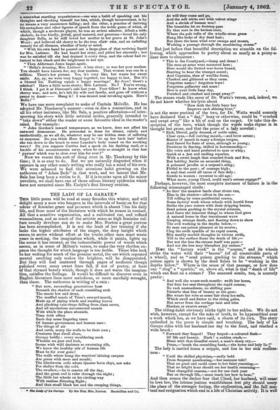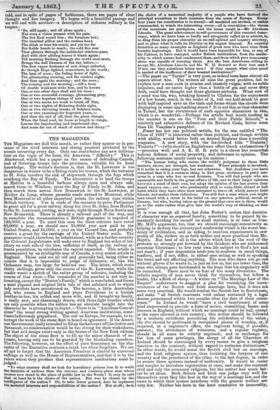THE LADY OF LA GARAYE.* THIS little poem will be
read at many firesides this winter, and will delight many a man who hungers in the intervals- of busir iss for that odour of feminine grace and presence which is absent f.om his daily life, and from most of the literature with which he comes in contact. All that a sensitive organization, and a cultivated ear, and refined womanliness, and as much of the artistic sense as high feminine cul- ture usually develops can do to make Mrs. Norton a great poetess has been accomplished. It is not the fault of her training if she lacks the higher attributes of the singer, the deep insight which seems. to arrive without effort at the truths other men must waste years in seeking, the imagination which, while it paints, lights up the scene it has created, or the indescribable power of words which seems, as in some of Milton's verses, to make the very rhythm ex- press the thought for which language is too feeble. Those who look to her writing for much of the genuine metal, the ore which repeated mental smelting only makes the brighter, will be disappointed. But they will find scattered through pages of mediocre though polished verse many sweet lines full, if not of poetry, at least of that rhymed beauty which, though it does not warm the imagina- tion, satisfies the feelings. It would be difficult to discover even in English literature lines more melodious, or more carefully wrought, than these. The authoress is writing of a ruin:
" But now, succeeding generations hear Beneath the shadow of each crumbling arch The music low and drear, The muffled music of Time's onward march, Made up of piping winds and rustling leaves And plashing rain-drops falling from slant eaves, And all mysterious unconnected sounds With which the place abounds.
Time doth efface Each day some lingering trace Of human government and human. care : The things of air And earth, usurp the walla to be their own ; Creatures that dwell alone, Occupy boldly : every mouldering nook Wherein we peer and look, Seems with wild denizens so swarming rife, We know the healthy stir of human life Must be for ever gone!
The walls where hung the warriors' shining casques Are green with moss and mould; The blindworm coils where Queens have slept, nor asks For shelter from the cold.
The swallow,—he is master all the day, And the great owl is ruler through the night ; The littlk bat wheels on his circling way With restless flittering flight; And that small black bat and the creeping things,
* The IA* of La Garay& By the Mon. Mrs. Norton. Macmillan and Co.
At will they come and go, And the soft white owl with velvet wings And a shriek of human woe !
The brambles let no footstep pass By that rent in the broken stair,
Where the pale tufts of the windle-strae grass
Hang like locks of dry dead hair; But there the keen wind ever sweeps and moans, Working a passage through the mouldering stones."
But just before that beautiful description we stumble on the fol- lowing, which approaches to poetry about as nearly as a penny-a- liner does to eloquence :
" This is the Courtyard,—damp and drear ! The men-at-arms were mustered here ; Here would the fretted war-horse bound, Starting to hear the trumpet sound; And Captains, then of warlike fame, Clanked and glittered as they, came. Forgotten names ! forgotten wars ! Forgotten gallantry and scars ! How is your little busy day, Perished and crushed and swept away !"
, The stanza reads like some of Dr. Watts's verses, and, indeed, we do not know whether his lyric about
"How doth the little busy bee Improve each shining hour,"
is not the more poetical of the two, for Dr. Watts would scarcely
have declared that a " day," busy- or otherwise, could be " crushed
and swept away" like a bit of coal on the carpet. Or take this de- scription of the hero, which though the words make rhyme is in thought but prose, and that the prose of a lady novelist :
" Bich, liberal, gaily dressed, of noble mien,
Clear eyes,—full curving mouth,—and brow serene; Master of speech in many a foreign tongue, And famed for feats of arms, although so young ;
Dextrous in fencing, skilled in horsemanship—
His voice and hand preferred to spur or whip ; Quick at a jest and smiling repartee, With a sweet laugh that sounded frank and free, But holding Satire an accursed thing, A poisoned javelin or a serpent's sting; Pitiful to the poor • of courage high ; A soul that could ;ill turns of fate defy: Gentle to women : reverent to old age : What more, young Claud, could men's esteem engage?"
Perhaps, however, the most complete instance of failure is in the following mismanaged simile :
As thro' the meadow lands clear rivers ran,
Blue in the shadow—silver in the sun—
Till rolling by some pestilential source, Some factory work whose wheels with horrid force Strike the pure waters with their dripping beams, Send poison gashing to the crystal streams, And leave the innocent things to whom God gave A natural home in that translucent wave Gasping strange death, and floating down to show
The evil working in the depths below,—
So man can poison pleasure at its source ; Clog the swift sparkle of its rapid course, Mix muddy morbid thoughts in vicious strife, Till to the surface floats the death of life;
But not the less the stream itself was pure—
And not the less may blameless joy endure."
Here the "factory work" is the "source," and its wheels strike the water with their "beams" (of all conceivable arts of a wheel), and so "send poison gushing to the streams," which poison again is shown by the dead fishes to be "working in the depths below." Where is the sense of that passage, or how does i one " clog" a " sparkle," or, above all, what is that " death of life" which can float on a stream ? The annexed simile, too, is scarcely poetic :
" And well she wears such mantle: swift her horse, But firm her seat throughout the rapid course; No rash unsteadiness, no shifting pose Disturbs that line of beauty as she goes: She wears her robe as some fair sloop her sails, Which swell and flutter to the rising gales, But never from the cordage taut and trim
Slacken or swerve away."
The riding-habit obviously sticks tight to her ankles. We do not wish, however, except for the sake of truth, to be hypercritical over a work which has, as we have said, a charm of its own. The story embodied in the poem is simple and touching. The lady of La Garaye rides with her husband one day to the hunt, and reached a wide brook :
" Forward they leaped! They leaped—a coloured flash— Of life and beauty. Hark ! a sudden crash,— Blent with that dreadful sound, a man's sharp cry,— Prone,—'neath the crumbling bank,—the horse and lady lie !"
The lady is carried home a cripple, and lies in her sick resiless- nese :
" Until the skilled pbysician,—sadly bold
From frequent questioning,—her sentence told! That no good end could come to her faint yearning,— That no bright hour should see her health returning— That changeful seasons,—not for one dark year But on through life,—must teach her how to bear."
And then comes the darker fear that Claud, her husband, will cease to love her, the intense jealous watchfulness lest pity should usurp the place of the stronger feeling, the explanation, and the full con- tent and resignation which end in a life of Christian activity. It is well
told, and in spite of pages of feebleness, there are pages of clear
thought and fine imagery. We began with a beautiful passage and we will end with another—a description of sickness solitary in the tropics :
" So, still again ; and all alone again ;
Not even a vision present with his pain.
The hot Real round him ; the forsaken bed ; The tumbled pillow and the restless head.
The drink so near his couch, and yet too far For feeble hands to reach ; the cold fine star That glitters through the unblinded window-pane, And with slow gliding leaves it blank again ; Till morning flushing through the world once more,
Brings the dull likeness of the day before,—
The first vague freshness of new wings unfurled, As though Hope lighted, somewhere, in the world ; The heat of noon; the fading down of light; The glimmering evening, and the restless night.
And then again the morning ; and the noon ; The evening and the morning ;—till a boon Of double weakness sinks him, and he knows One or two other days shall end his woes : One or two mournful evenings, glimmering grey, One or two hopeless risings of new, day, One or two noons too weak to brush off flies, One or two nights of flickering feeble sighs, One or two shivering breaks of helpless tears,
One or two yearnings for forgotten years,—
And then the end of all, then the great change, When the freed soul, let loose at length to range, Leaves the imprisoning and imprisoned clay, And soars far out of reach of sorrow and decay.' "



































 Previous page
Previous page